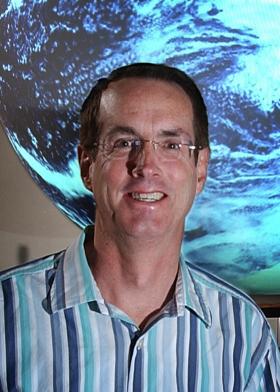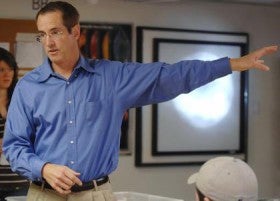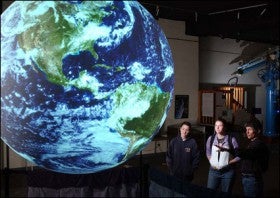Five questions for Doug Duncan
In the late 1960s, NBC threatened to cancel the original "Star Trek" because of low ratings. A letter-writing campaign ensued and several hundred fans marched at the studio in Burbank. The group hoped to save the series, which they called the most imaginative show on television. Doug Duncan was among the marchers and he still feels the same about exploring a universe filled with surprises and sublime images. It's one of the most imaginative things the human race does.
Duncan is a professor in the department of astrophysical and planetary sciences at the University of Colorado at Boulder and director of Fiske Planetarium.
His interest in space began not with Capt. James T. Kirk and the starship Enterprise, but in second grade. Because there were no standards for teaching science, the subject was ignored. When Duncan's second-grade teacher was ill for a month, the principal stepped in. He taught the class about stars and planets, and even loaned Duncan "The Golden Book of Astronomy: A Child's Introduction to the Wonders of Space."
Duncan was hooked. Now he not only studies the universe but is dedicated to improving the way science is taught and how discoveries are communicated to the public. For several years he was a science commentator on National Public Radio; this month, he taped a History Channel program concerning the upcoming death of the sun – 5 billion years from now.
He's also led tours around the world to photograph Halley's Comet, total eclipses and the spectacular northern lights. Duncan came to CU in 2002.
— Cynthia Pasquale
1. You helped modernize a planetarium at the University of Chicago. What does that entail? What have you done or what do you hope to accomplish at Fiske?
Part of that position was to spend $50 million to modernize Adler Planetarium. It was easy spending the money; the hard part was getting people who for years had taught just one part of astronomy to re-orient themselves – to teach what's happening in astronomy today.
Planetariums were the first virtual reality environment. When Zeiss invented the planetarium (in 1924 in Germany), people were amazed that you could go inside and it would be just like you were under the stars outside. Almost 100 years have gone by and what astronomers study has changed a lot. Most of us don't spend our time measuring the positions of stars, we spend our time studying the evolution of stars and galaxies; we study black holes; we study cosmology and what's at the end of the universe. A lot of planetariums, sadly, have not changed as fast as the science of astronomy. Modernizing is partly about technology, but it's even more about teaching.
The changes at Fiske are significant. I was able to bring in approximately $1 million in grant support and turned the lobby into a hands-on science museum. What gets the most attention is called "science on a sphere." When projectors shine on the 6-foot sphere, it comes to life. It's like you're looking down on Earth. We have a direct connection to the Earth's weather satellites and can see hurricanes form and move across the planet; we can see tsunamis go across the ocean. Then we flick the switch on the computer and can change the sphere into the moon or Mars.
We've also started to distribute nationally the shows produced at Fiske. I have created a consortium where all the leading universities with planetariums have agreed to use what we produce in astronomy courses all around the States.
Planetariums are going digital. It used to be they all had these big machines in the center to make the stars project on the dome. But the really interesting things in astronomy are black holes and colliding galaxies and you need to show that as a video.
Consequently, it is now possible to turn the entire dome into the equivalent of an IMAX screen with special projectors. On the evening of July 30, we're going to have a free demonstration of an all-video, 21st-century theater at Fiske. We're hoping university and community members will support this new theater. If anyone wants to attend, they should call Fiske (303-492-5002) and ask for a personal invitation. This will ensure CU has the leading planetarium in the country.
2. What do you hope students take away from your teaching?
For two years, I've taught freshmen and sophomores in my intro astronomy course. They're going to be journalists, business majors, poets – but not scientists. Every other week I have them go to the Web to find something that is good science and find something that is fake or pseudo science that is trying to fool them.
We discuss in class how the science they've learned helps them decide whether what they've found is believable or not. An educated student in the year 2010 has to be able to work with the media we live with. It's not about learning to use an iPhone; the important part is learning how to critically interpret what you download. Much of our current world depends on science. Unless you understand it – global warming, capping oil wells, energy – you're left out. It's important that the average citizen learns enough science to function well in the world in 2010. And besides, some of them will grow up to be congressmen and senators and control our future.
3. Do you believe there is intelligent life in the universe?
You have to look. The thing that distinguishes science from philosophy is that science has to be tested. When I was doing radio broadcasting, people would call in and ask, "Are there other planets out there with life?" I would tell them that when we started to look seriously for planets we would find out if they were there or not. Sure enough, during the past 10 years, we have found hundreds of planets and they are made of the same stuff that planets in our solar system are made of. Whether there is life or not? You have to look.
4. There's been a lot of debate about where the U.S. space program should direct its funding. What are your thoughts?
I think the funds we have for all kinds of key things – universities, space exploration, teaching – are all artificially reduced because we spend so much money on military expenditures. A thousand times as many Americans will die from heart attacks and strokes than will die because of terrorists. That's not to say that the U.S. doesn't need a strong military, but it is to say that if the U.S. was wise, it would readjust the balance on what it spends domestically on its own citizens compared to what we spend on war.
I took 100 Americans to see a total eclipse of the sun in China. What we all saw is that China is investing proportionally much more in universities and industries of the future. Every apartment building has solar heating on the roof. That's the kind of investment in science that I advocate.
5. You've written a book, "Clickers in the Classroom," that describes how wireless technology improves science teaching. In what ways do clickers, or classroom response systems, help?
There's an enormous amount of research that says the key thing to how much someone learns is how active their mind is – how engaged they are – not how active the teacher's mind is. A lot of what we were taught in the past is that the greatest teacher is the sage on the stage. A lot of us have been taught to be clear and exciting and expressive and be interesting and move around the classroom, then call on one student. But one student responds and 99 others switch off their brain and just listen. So the idea that you can get every single student engaged at one time is remarkable. Clickers simply make it easier to do something that we all thought important, and that is to keep the student engaged. You ask them a question that is challenging and give them several minutes to talk with neighbors. The process of trying to convince someone else is when you learn the most.
Want to suggest a faculty or staff member for Five Questions? Please e-mail Jay.Dedrick@cu.edu




